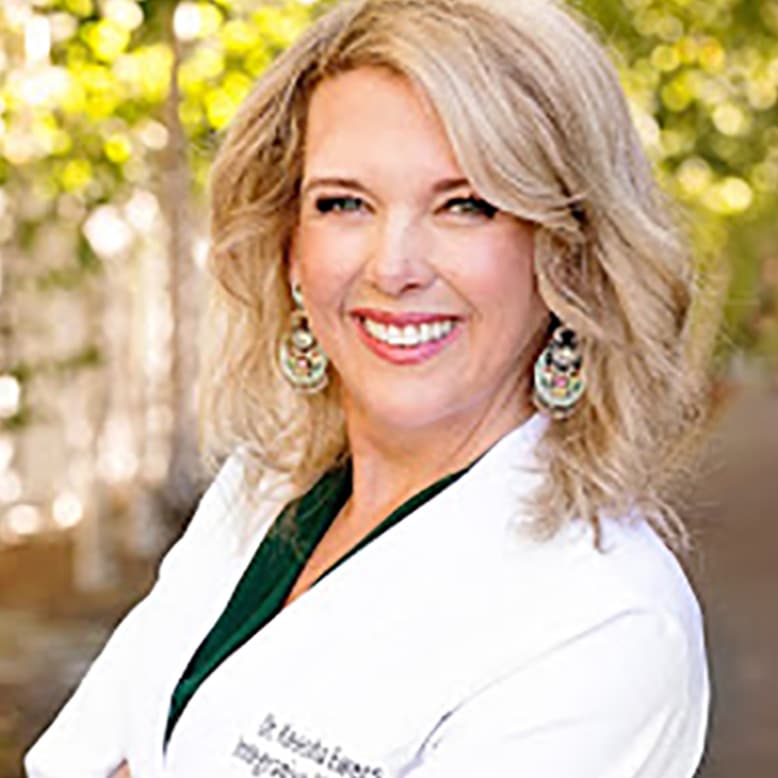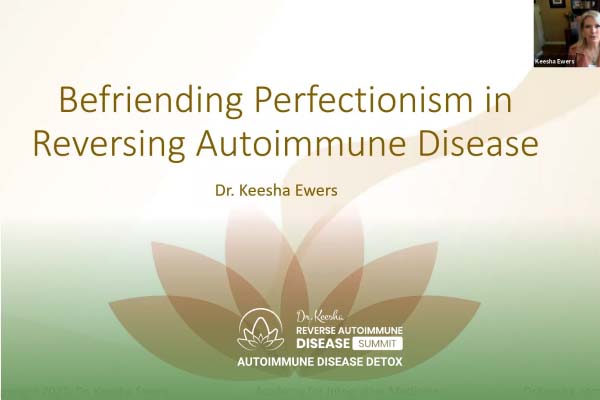Join the discussion below

Keesha Ewers, PhD, ARNP-FNP-C, AAP, IFM-C
Dr. Keesha Ewers is an integrative medicine expert, Doctor of Sexology, Family Practice ARNP, Psychotherapist, herbalist, is board certified in functional medicine and Ayurvedic medicine, and is the founder and medical director of the Academy for Integrative Medicine Health Coach Certification Program. Dr. Keesha has been in the medical field... Read More
Keesha Ewers, PhD, ARNP-FNP-C, AAP, IFM-C
Welcome back to the Reverse Autoimmune Disease Summit series. This is the fourth iteration in the Reverse Autoimmune Disease Summit series. You’re joining me for the auto-immune detox. Now, we’ve been talking, this is the sixth webinar that I’ve done for the series for you. And we’ve been talking a lot about the four Ps of auto-immune disease which are perfectionism, people pleasing, holding onto the poison of past pain and the Pitta Dosha aggravated medicine causes a lot of inflammation if it’s out of control. We’ve been talking about emotional detoxification, the freedom framework that I use to help people reverse their autoimmunity, about leaky gut health and genetics and toxic burden and your body’s ability to detox those toxins whether they’re physical, emotional, mental, spiritual. So we’ve covered a lot of ground in this series. This next one is something that’s near and dear to my heart. I am in a Master of Divinity program at a school called Maitripa College which is a Tibetan Buddhist Masters of Divinity.
I went there realizing that Tibetan Buddhism has some of the most advanced technology on mind training available on this planet. And I thought, wow these guys just really know how to do this and I wanna learn it and it’s been amazing. And one of the concepts within Tibetan Buddhism is this idea of what are called the six perfections or in sanscript the paramitas. And so I talk about perfectionism being one of the problems that causes autoimmune disease along with people pleasing and past pain or trauma. And so this I thought would be a really fun kind of fascinating look at perfections that from a Tibetan Buddhist standpoint that could help you befriend perfectionism in reversing your auto-immunity.
So again, if you’re just joining me and you haven’t joined me in the rest of the series this is the sixth webinar that I’ve done in a row for the series of reversing autoimmune disease. I was able to reverse my rheumatoid arthritis in my early 30s within six months without using methotrexate and other medications because I started realizing that this, probably the way I drove myself and the way that as a perfectionist and the people pleasing that I was doing, and the past trauma that I had. I realized must have something to do with the disease process that I was experiencing after the birth of my fourth child. And so sure enough, when I dove into it, it turns out I was able to reverse the autoimmunity fairly quickly by approaching it from that direction.
And I talk a lot about this and much more ducks in my book “Solving the Autoimmune Puzzle” and it’s companion book the “Quick and Easy Autoimmune Paleo Cookbook.” So this piece that I’m going into today for those of you that don’t know me too I’m a Family Practice Nurse Practitioner with a specialty in integrative medicine. I’m board certified in functional medicine, board certified in Ayurvedic medicine. My PhD is in sexology. I’m certified in five different psychotherapy trauma release modalities a certified energy worker, yoga teacher and meditation teacher and conscious dying doula. And then, like I said, a master’s of divinity student and the founder of the Academy for Integrative Medicine Health Coach Certification Program.
So in this webinar, what I thought I would do is, you know we talked about these four Ps in past webinars and how they impact your immune system. You’ve been tracking that with me. Now, I really wanna go in how to be friend your perfectionism, what these six perfections are, how you can use them as a path in a daily practice to really liberate you from your suffering. Autoimmune disease is one form of suffering. And so the way that we’re doing this and I’ve shown you these Panchakosha’s in the other webinars, you know of course in sanscript Pancha means five kosha means sheath or this is layer that we have more than just our physical body. The annamaya kosha is the physical structure that contains your DNA and your cells and your organs and your tissues. And then your energy body or the pranamaya kosha is the one that has those 72,000 noughties or srotas.
These places we call them chakras right where these nerves cross 72,000 places in your body where you have these channels and those connect to your emotional and mental body, your manomaya kosha where you store your beliefs and the patterns that you’ve created from childhood that have activated your nervous system in very particular ways, based on your beliefs you created as you made at meanings to go with the experiences of your early life, as you were developing and as you’re going through your different developmental states. And these different places depending on the trauma you know have caused attachment disorders or other traumatic ways of, you know we could call it arrested development in each of these developmental states.
With coping mechanisms you create as behaviors to adapt to that, which are why’s, the why is mind of the child’s incredible. Remember a child brain doesn’t have a prefrontal cortex yet that’s fully developed, not until you’re 24 to 26 years old. So this limbic system is very active. Like I have to survive in this world as a little being that’s being governed by big beings, right. That are telling me how to do what I’m supposed to do and am I doing it right? And am I okay? And am I good? Am I bad? And so those meanings that we create then governess and adulthood until we take the time and this is that spiritual body, you know, where we take the time for the mind to start looking at itself. The mind can start looking at the mind in these early patterns and actually they can shift, that’s what’s so beautiful.
So remember the four P’s of auto-immune disease are people pleasing, perfectionism, poison from past pain and that Pitta Dosha type in Ayurvedic medicine. Now in my doctoral research from 2013 I conducted the healing unresolved trauma study. And what it did was it explained why the adverse childhood experiences study the ACEs study cam up with the results that it did, which said that the higher the number of traumas that the more traumas you have in childhood the higher your risk for all the chronic things that we see in our healthcare system today including auto disease in cancer, as well as addiction and a lack of willingness to engage in self care. And that also it will reduce the number of years you have in this human body, if you don’t do something with it. So in other words, the higher risk for chronic illnesses and the lower number of years that you get to live in this human body, that’s not set in stone. And so the healing unresolved trauma study, what I discovered was, you have this initial hurt in childhood and it can be not getting picked for a ball team.
It can be being the last one called for red rover, red Rover or you’ve got four little girlfriends on the playground one day in elementary school, and the next day they’ve all turned against you. You know, like it’s, it doesn’t necessarily need to be sexual abuse, domestic violence, emotional, psychological abuse, neglect, abandonment. Those are the capital T traumas, right? Having a caregiver that’s mentally ill or incarcerated or addicted to a substance or divorced or dead. These are all big traumas the capital T kind. It can be the lowercase T kind. ‘Cause remember that we are biologically wired to know that if we’re put on the outside of the firelight circle in our tribal days, the saber tooth tiger can eat us.
So any experience of rejection or betrayal feels like a big trauma to us, and then as a child because it’s a naive trauma, a new one right. Then we’re going to make up a meaning about it which will be self-centered because children are self-centered and narcissistic they’re supposed to be everything’s about us. We’re trying to figure out how to survive, right? It’s all about us. Parents get divorced, children make it about them, right? Because we’re trying to create meaning about our world. And we’re constantly making that meaning. So we have an initial hurt and we can track mine. Okay, I use mine just to go through this model because it’s easy to track. 10 years old, I’m sexually abused by the vice principal of my elementary school. That first initial hurt, okay, I feel an emotion from that which is panic, terror. And then I’m going to engage my sympathetic nervous system. And in this case it’s going to be, not fight, not fleeing, not fainting, but freezing most children freeze. Because we’re not powered, we don’t have any power.
We’re not autonomous beings in childhood. So most of us freeze so that then panic gets frozen in my body. And I have an activation pattern around it no and then I’m going to create a meaning. Now, my vice-principal said that this was my fault that it was happening. So the meaning is I must not be good enough. And people in authority who say they’re here to keep you safe, can’t be trusted. That was another meaning. Belief that I put in place was, “Oh I have to actually be perfect “and please all my teachers, people pleasing “so that I’m kept safe, “because the teachers are the ones that can send you “to the principal’s office.” So perfectionism and people pleasing are the behaviors that are adaptive for that kid in that moment.
Now those are not great adult adaptive behavior. So what happens is we have this opportunity throughout the life span, okay to do something about this but this is how it gets cemented in. And it creates a button that can be pushed over and over and over again. And we have these different coping strategies that are patterns that we develop that are left in our body and in our emotionality and the way that we perceive everything. And the way that we project our energy into the world. All of it is affected by these early meanings and beliefs and these behaviors until we do something with it, and it’s going to affect how our genetics express themselves our immune system, our hormone regulation because our adrenals are directly attached to our perceptions. If you perceive yourself as being a zebra being by a lion all the time, you’re overwhelmed, you’re unsafe all the time.
Then those adrenals are going to keep reacting. And that zebra that’s being chased by the lion knows it’s not safe to stop and have sex and reproduce. And it’s also not safe to stop and go to the bathroom. So your digestive system will shut down, slow down. And all the hormones used for reproduction or for your brain to work really well and your skin to look good and your insulin to be used properly. You know, all of those things will actually all get co-opted for your adrenals to have cortisol ’cause cortisol is going to be that stress hormone that’s necessary. Every time you perceive yourself as unsafe because your body knows that survival wins over reproduction, okay. Reproduction is secondary to survival. So on the left-hand side of this model is the maladaptive processing loop. So the one that you created in childhood so you’re not gonna be self confronting. You’re not setting boundaries with yourself.
You’re just doing what you’ve always done. Which is automatic negative thoughts. Whenever someone pushes that button you’re ruminate about it. It creates a relocating and judgment, and that creates disease because cortisol being released in perpetuity is breaking down your gut wall, which is creating problems. As you know, you have foods that go through those little breaks in your gut wall then your immune system can’t, you know counters and attack against that, which is not okay. And against blueberries sometimes, you know, sugar, alcohol all those things. And then in between those guts walls cells that are opened up now, bad bugs can come and live. Do you have a hundred trillion microbes that live in your digestive system? They outnumber yourselves tend to one. And if you’ve got little apartment complexes opened up from cortisol, being always released from your perception saying you’re unsafe all the time or overwhelmed or not good enough, not beautiful enough, not smart enough, whatever it is, can’t keep up.
Then those little apartment complexes get filled up with dysbiotic bugs, right? Yeast, parasites, bacteria that don’t belong there. And then that impacts your mood, your memory, your immune system. Okay so you can do something about this. You can go over to the right side of the model which is the willingness to change all that. And when I say what I say in the middle is you’re able to self confront and set boundaries with yourself and then others, but first with yourself with your own thoughts. So you’re creating adaptive memory processing now which could mean you need to do some trauma work. And then I have a bunch of things that I do with people called Mirror Work and it leads to forgiveness and the five RS that we’ve gone through in the other webinars, but that’s the integration of all of this. And so one of the pathways to be able to do this is through these six perfections really great way of doing this.
We’re hooking up your brain to your heart, right, we’re bringing compassion into the process. We really want to not just have this judgment re-looping of automatic negative thoughts that are coming through as perceptions in a pattern that was created when you were a small child in a situation you can understand. So we’re going to drop in and we’re gonna connect that to your hearts and bring some compassionate curiosity into it. And it can change the way you’re perceiving which then changes the way your entire body reacts and responds, a non-reactive mind non-reactive emergency system. So the way that Tibetan Buddhist, Buddhism talks about this is that, it’s in something called the abi dimer kosha and it’s this amazing Buddhist material that’s volumes and volumes and volumes.
And when I first started studying it, it was before I went into this college that I’m learning in now, I was amazed at how much more complex and detailed information there was from these amazing people that have spent so many years just studying the mind and then passed on this information. It’s incredible and so one of the things that they say that was new for me is that there are actually six minds, not just one and the six minds, five of them are your sense minds like your eye mind, your ear, mind your nose mind, right? And that the six minds bring information from your world to the other the sixth mind that then does that perceiving and that there’s 17 steps to doing the perceiving. There’s not just an instant perception.
There’s actually 17 different steps in one perception. So in that 17 steps of perceiving step number eight is called the gateway or the doorway to karma. And the reason that that’s there is because what they say is how you have perceived in the past. In other words, remember the HURT model how everything started when you were a kid and then the way that they conceptualize it as also in other lifetimes before. How you’ve done it in the past is how you’re going to do it in the future. You’re just gonna keep doing it the same way. Unless you get into that doorway to karma that gateway to karma which is this tiny little gap, and you make a shift.
And the way to do that is through the six perfections but it takes, you have to like really have a practice of meditation to be able to sit still and allow the mind to see the mind to witness the mind. Okay so the four P’s of auto-immune disease, then the poison from past pain, which create perfectionism and people pleasing that can be witnessed in that doorway to karma. If there’s time spent to do it, remember the Ayurvedic medicine says auto-immune diseases is undigested anger. So when I first learned that when I was first diagnosed with rheumatoid arthritis at the age of 30, I didn’t even think I was an angry person. I didn’t even think I had anger, I didn’t even recognize my anger turns out I was really angry and I had a lot of reason to be.
But if you’re a people pleaser and you’re trying to be perfect then you’re not going to be, allow yourself to have the feeling which in Tibetan Buddhism they call it an afflictive emotion anger and afflictive emotion. And so it gets what happens to it. It’s an digested and it just circulates. So harmful thoughts stir the wind of the mind, these afflictive emotions, right? We in Ayurvedic medicine, we talk about five elements, space, air, fire, water and earth. And then there are doses attached to each of them. Well harmful thoughts are in Tibetan Buddhist medicine. We have loom energy, right? It’s going to stir the wind of the mind. So it’s important to take a look at this. And so we wanna change our view on perfection then, right? So the Sanskrit word is paramita as I said, “Gone beyond,” we’re going beyond. And one of the things that you’ve heard me teach a lot about is that all unhappiness comes from unmet expectations.
Well, one of the things that Tibetan Buddhism says is that all suffering comes from self cherishing. And so some of those expectations that we have are of others, of life, of perhaps your view of like the divine, maybe God, a creator, the earth politics, what you can look at the literally tens of thousands, maybe hundreds of thousands of expectations that we hold constantly, always actively engaged in expectations expectations of our bodies. Oftentimes people when they’re diagnosed with an autoimmune disease they’re angry at their body because they have an expectation that the body’s supposed to behave in a very specific way but nobody ever promised us that the body is supposed to behave in a very specific way or that our children are supposed to outlive us or that we’re not supposed to get hit by a truck.
You know, there’s all this there are these weird expectations we have and I’m not sure where they come from but the way that, you know Tibetan Buddhist thought is, is that well, Buddhist thought in general, there are these four noble truths and that the truth of suffering is real. And you know, all suffering is coming from this idea of self cherishing. So there’s a difference between the self cherishing of the ego and of our consciousness. Okay also call higher mind or your higher consciousness or your higher self. So what we wanna do is remember that it’s said that if you change one little one little tick on your compass, then you’re gonna go into a completely different direction.
That’s what we’re up to. And by doing this work of not having so much energy around having to have everything out here be okay for us to be okay. Right for everyone to be responsible for our self cherish and for our expectations to be such that that we’re going to suffer if they’re not met. Remember that Gerald Pollack Dr. Pollack’s talk that I interviewed him for the Summit and he talked about structured water. And the fact that it’s H3O2 instead of H2O right, that that’s the structured water is the water that our cells can actually use. It’s the one that brings us health in Ayurvedic medicine we would say probably structured water is the same as . And our brain is 73% water eyes are 95% water, our blood is 94% water we’re made of water. And so if we think about the kind of water that our bodies can use that brings us health, it’s the structured water.
And the only way that we get structured water that’s usable by us is if you remember Dr. Pollack talking it’s through light, they’ve already said that they discovered that in the lab where they put in for red light and all of a sudden the water went into structured water, it was amazing. And that there are all these different things that we can do to change the molecular structure of our water molecules in our bodies. And that actually creates health. Well, one of the ways of doing that is to relax the energy and bring light, right? Shining light the mind witnessing the mind to relax that tension about are people behaving the way I want them to. When you have that tension, like they’re not meeting my expectations, right? Everybody else is, they’re not doing what I need them to do. And trying to control that we’re not going to get those structured water molecules, the way that we would if we’re relaxed and we’re in the forest, we’re earthing right. We have our feet on the ground we’re happy, we’re not suffering.
And so this is the why of doing this work. The six perfections are really going to actually help the molecular structure of your cells and help you to reverse auto-immune disease, this is how it happens. All right, so the six perfections or the six paramitas are generosity, ethics also called morality and the literature, patience, perseverance, concentration, and wisdom. We’re gonna go through each one of those. So the first one is generosity. Just looking at this picture, you know, the beauty of this and gazing at it for however long just dropping yourself into the beauty of this and using it as a one pointed focus. You can feel everything calm inside of your system, right? This is what I’m talking about.
When I’m talking about changing the molecular structure of your water molecules. If I take my eyes away from this picture and instead I direct them to I don’t know This, my calendar. I can feel a different energy immediately. Like this is all the things that are expected of me. This is peace, so what can you do as your mind witnesses itself? Okay and watch how everything changes inside of your body as a result. Okay so generosity there are three different kinds of generosity. And the way that I first discovered the six paramitas was before I was in this masters of divinity program there was a book I came across through some synchronicity from a teacher named Lama Zopa and it’s called “The Six Perfections.” And the book is really good. I would recommend it, in fact I’m gonna pause this for a second. Let me pause the recording. Okay, so this is the book that I ran across and I was meditating and I heard this word in my mind and it was just perfections and it had an S on the end of it in my meditation.
And I remember thinking perfections, what, and I’d never heard of such a thing. And I went to Google ’cause I’m used to like, just looking things up. And I looked up perfections and this book came up the “Six Perfections” by Lama Zopa Rinpoche. And I thought, well okay. And I ordered it and it is so good. This is so good, and I thought, wow this is a way of really doing the things that we’re talking about here, where I teach people how to reverse their autoimmune disease heal their trauma, do all these different things. And this is an amazing pathway for that. And so I bought a copy for every one of my children, my parents and I was out of noxious person. And just said, “I’m curious what you all think about this,” and everyone that read it, loved it. And when I read it, I thought, Oh, this man is an amazing teacher and is so articulate in some of these incredible teachings that would like liberate you from suffering. And I wonder if he’s still alive I would really like to have him be my teacher. And so I looked him up again on the internet and sure enough, he was still alive and then I saw Maitripa College and applied and got accepted that very week.
It was just like, boom, boom, boom, boom. I think I read this book in late March and then in April was the deadline for application within one week, I had applied. And I was attending school by August, you know so it was all this very synchronous process that happened but it was from this word perfections that came up in my meditation. And one of the things that he says in this book is perfection is one of the most important of the six perfections is generosity. And if you don’t do anything else in your life if you just spend the rest of your life cultivating a generous heart that that right there will be so amazing for helping create a really beautiful death. And then if you believe in reincarnation a really beautiful rebirth and so generous heart was something that I started thinking about like cultivating a generous heart.
How do I cultivate a generous heart? Well, there are three kinds generosity. You can be generous in your material giving you can be generous in helping people relieve their fear, right? They’re suffering a fear of change. And then you can also help them by giving them a reminder of connection to something greater than the moment that they’re in, when they’re suffering. So these are the three kinds of generosity that you can practice. So that makes sense like we live in this time right now of a pandemic and a lot of people are feeling overwhelmed and disconnected. And so a generous heart if you think about those three different kinds of generosity, it’s I think, you know, that one of the most generous things that you can do is to give of yourself in that way of helping to reduce fear and the suffering of change. Because I think a lot of people are suffering from that right now, things have changed so quickly and so dramatically. And then we are part of, of course a larger field, right?
It’s not just us where in Rupert Sheldrake called it the morphogenetic field that we’re giving and receiving information to each other all the time. And so the more that our resonance is that of love and compassion, the more we are impacting those around us on the field that we’re interdependent with and interrelated with. And so that in and of itself is generous. The more that we cultivate compassion for the human condition, for the truth of suffering for what’s causing the suffering and then embark on the path to relieving that suffering for ourselves and each other with compassion, that’s the generous heart. And we have no idea the ripple that it, you know that pebble that we throw in the water creates in our own dimensions of mind, and then our connections to others that are in the same field with us.
So the second perfection, or parameter ethics or morality. I used ethics because oftentimes morality has it’s kind of a charged word. So ethics means not harming others through actions of body, speech and mind. And each of these perfections are connected. They’re not just stand alones, right? So if we’re giving someone food, we’re generous but we’re also abstaining from harming them that if we just walk past a starving person that’s a form of harming them. So we’re doing two, we’re engaged in two of those perfections when we feed them, patients of ethics, which is another the perfections is being patient when others harm us and by not retaliating, which is also generosity. Perseverance is continuously feeling joy in our positive actions or what they call creating positive merit. Concentration of ethics we say which concentrations is one of the perfections we stay one pointed in being of service to all that is.
And then wisdom of ethics is remembering that the other is us, that we are all part of this field that if we were to remove time and place and concepts of phenomenon, that we can only see through our five senses being what’s absolute and real and move into a larger way, a more cosmic way of viewing that we would call it emptiness, then that’s the wisdom of ethics, so that’s called wisdom. So just knowing that every single thought we have forms us and our reality, every one of them. So we’re, we’re constantly forming our reality. And we are joined some of you have heard about the last near death experience. I’ve had three of them near death experience that I had. I was struck by lightning, and as I left my body I went into this grid of light that looks like this.
You know, it was a grid. And each one of the bars of light was one of us and our inner connectedness lit up that grid and the ones that were engaged actively in cultivating a generous heart and being patient and their own self, you know growth of self-awareness and being able to witness self and be able to really shift, right? Like I was talking about in that doorway of karma, out of afflictive emotions, like fear and anger and jealousy then the light was brighter and the grid was powering the planet. Like this was part of our life force energy. And that it was not just optional for us to do this kind of work. It was essential that we had to be engaged in this is what that near death experience showed me that this is how important it is. That is actually our life force as a as a species and as a world and all the sentient beings that we share it with.
All right, so patience is third one. And there’s a saying that says, “Petty tyrants are our best friends and teachers “because they teach us patience.” So constantly being in touch with your thoughts is required for patients and can in you if you can engage in this complete conviction, that those that hurt you have also been hurt. That doesn’t mean that you have to keep showing up for a beating. It means to have a boundary, but at the same time as having the boundary, you can also have compassion. You don’t have to keep showing up to the person to hurt you but you also can remember on the HURT model where it has the maladaptive way of being then there’s judgment and re-looping and automatic negative thoughts.
Those afflictive emotions and thoughts are not patient ones. So if you can live in the compassionate space that says, “Oh, if someone is being hurtful, “it means they’ve been hurt.” Then I can be curiously compassionate toward them and go from there. And like I said you may not even have need to be in front of them. Remember forgiveness and reconciliation are two different things. Reconciliation only happens if the person is safe and contrite, but everyone becomes in need of our compassion and sometimes good boundaries. So there are three kinds of patience, the patients of disregarding the harm done by others so you don’t hold onto it and ruminate about it and cause resentment in your body. Remember I say, resentment is the most infective and destructive chemical on this planet. And it’s not made by corporations and dumped into our air, water and soil. It’s made here and dumped into ourselves so that our mitochondria are bathing in our own resentment.
So disregarding the harm done by others is letting go of our harm in our past being able to not have resentment, the patients of accepting suffering, like life brings suffering. And if we feel we’re undeserving of it then we’re going to have resentment and anger. We all deserve suffering because nobody says that we don’t. I mean, there’s no promise that we don’t have suffering. The reality of life is there is suffering. And why not you? People always say why me? I don’t deserve this. And I’m like, well, what who says that? Because if you have a larger view of all of it then you start seeing, “Oh, it’s the suffering moments.” Those parts of my timeline, where I learned the most wisdom if I was willing to self confront and suffering will happen. Okay so patients when it’s happening patients of gaining certainty about the fact that that suffering is part of a larger spiritual path then you can actually bring meaning to it, right? Remi I think is the one that said, “If you’re upset every time you’re rubbed “then how will your mirror ever get polished?”
Very, very true isn’t it? I think there’s a Japanese proverb that says fall down seven times, get up eight or something like that, right? All of these are meant to teach us that yes people will hurt you, life will hurt you. You will suffer, you will have challenges you don’t think you can overcome. And in those moments Joseph Campbell calls it the hero’s journey, right? Those moments are the time where you go find mentorship. Maybe it’s a spiritual teacher or a teaching and then you start practicing it. And as you integrate it, you come out in a new level of development and your ego might have a little less hold on you. And you might be a little bit more polished and then it will happen again. And again and again until you die, that’s how life works. And so if you can be patient with that then you don’t get upset and you can get to the learning of it quicker, right?
All right, so this picture I love because anthropologists call what I just described. Liminal space, it’s the space of transitions. The threshold of moving from one developmental state to the next is often a space of darkness where we’re in a space where we can’t see anything as we’re moving from one developmental state to the next and that darkness can be scary. But if we’ll sit still be patient, practice generous heart, compassionate curiosity and hold to our ethics, we will get through that space into the next doorway, that light at the end of the tunnel. And then for awhile, we’ll be there and it will feel really good and we’ll be happy and content. And then we’re gonna get to our next liminal space again.
That’s how it works. Those are called transitions and all of us have them. And so we can think of them on a micro cosmic level of each of us as individual beings in the timeline that’s linear, which doesn’t really exist. If you think instead of yourself as a cosmic being of your preconception self and the one who will draw your last breath is all available to you in one cell of time, you have access to all of those You can actually have your wiser self weigh in for you. If you’d like. You can have the one that it’s often called your oversoul or your luminous nature. You’re, in Buddhism it’s called your Buddha nature. You can actually access that one and ask for the wisdom that it brings which is usually all of this is impermanent and empty. So if you can rest in that space of silence it’s a repository of peace and stillness.
Then whatever’s got you activated can relax right? So perfecting patients is remembering that without an enemy there’s no chance to practice patients with no more anger there are no more enemies. So really like learning to digest anger becomes really important and that is cultivating a generous heart being patient. The real enemy is the self cherishing mind that feels like it needs to get defended, right about how someone’s seeing you or how they’re treating you. And if you can relax into that more cosmic consciousness the clear light of who you are, your luminous nature and you can see there’s nobody can say anything that really harms you and trying to manage your image and how others see you is really a waste of time and energy, right? So the one who is truly brave is the one who fights the inner enemy the one who wants to control everything out here and how it’s happening in order to feel okay.
This is the puppet, right? Controls the mind that has all those afflictive emotions of jealousy and anger and hate. But the thing of it is, it’s based on this ignorance that you are beyond all of that, your luminous nature is beyond all of this. And the ignorance that anything that we take a look at that we can lay our, any of our five sense minds on is actually impermanent. We are impermanent, everything that we can put our sense organs on is impermanent. So if I need for it to be permanent is what’s causing our suffering. If we can let that go, then the puppeteer relaxes. So why be unhappy if there’s a solution? What good is discontent? If there’s no solution, what good is it anyway? Shantideva is the author and an amazing, amazing historical teacher of the way of the bodhisattva the “Bodhisattva’s Way of Life,” sorry.
So then it sets, it sets the mind free from the cage that we put it in, right? What are we put our own mind remember in the last webinar I did. I showed you the mind and it’s the brain and its cage, the mind and the cage. We’re the ones that create the mind traps and then our heart can open the door and let it free. So perseverance is the fourth parameter three kinds of perseverance armor like perseverance the perseverance of gathering virtue and the perseverance of working for the welfare of others. Petty tyrants are best friends and teachers so hard to remember that persevering with that thought, right, having compassion, constantly being in touch with your thoughts, that’s perseverance. Complete conviction that those are hurdles have been hurt, persevere without thought they become a need of our compassion and boundaries, perseverance with all of that. And then the rigid mind can begin to dissolve.
Remember, like I said, in the last webinar a rigid mind creates a rigid immune system, a hypervigilant mind am I safe? Am I okay? Can I trust? Creates a hypervigilant immune system? All of these things create auto-immunity. So once we can start seeing that it’s Oh it’s not rigid soft, it can dissolve kind of like Moonlight touching water. Oh, the mind can touch just like that. The awareness touches like Moonlight touching water or you seeing your reflection in water and just soften all of that with perseverance. Barriers for perseverance are the laziness of procrastination. The laziness of being attached to worldly affairs the laziness of discouragement and low self-worth the tyranny of self relevance, this is a big one.
There’s some information research that’s been done on death anxiety where when we start really viewing our own mortality and auto-immunity makes us view our own mortality. There are two things that help us really relax that death anxiety. One of them is the need for immortality. And so we go into after life thoughts like, “Oh, I’ll go to heaven. “Our God,” you know, like after life thoughts and Tibetan Buddhism, it would be something different like another wonderful reincarnation or going to a Buddha land. This helps to dissolve death anxiety or symbolic immortality where we actually want to become self relevant. We want to leave a legacy, we wanna be known for something we want to pass on our genetics. We want to have a big building with our name on it. You know, all these things are called self relevance and that that need for self relevance will keep us. So there’s laziness of mind and then there’s overactivity of mind. And both of those are barriers to perseverance and then ignorance, ignorance, attachment and anger.
Remember hypervigilant mind makes a hypervigilant immune system, except when hypervigilance is the attention to our positive actions, right? That hypervigilance doesn’t have that same rigidity. It was like in the picture I showed you where there’s softness, like Moonlight touching water that we just kinda keep that vigilance there, making sure that we’re engaged in the service to others, making sure that we’re keeping in that positive thought stream, don’t go to sleep, letting our vigilance waiver lapsing back into non-virtuous actions and wasting this precious chance that we now have in this lifetime.
That’s a lack of perseverance. And those coping strategies that I showed you like in the hurt model the ways that those behaviors we created, according to our meanings and our beliefs and childhood, those are like ruts in a record, right? The grooves, so you wanna take the needle out of the groove. You wanna put our hand in the perceptual field of the 17 steps and open the doorway to carmel a little bit and take a look at how we’ve always done things and shifted with perseverance. Remembering that success isn’t linear in this we’re going to fall down eight times, get up nine, right? That the road to liberation of all of this is not quite so straight as we would like to think. This is very messy sometimes, especially in this mind. So reflecting on impermanence can generate perseverance. If we realize that the thing that’s distracting us is impermanent then we can come back again generating a generous heart cultivating right generating positive merit, cultivating a generous heart being patient, persevering, keeping to our ethics.
Concentration, so in order to concentrate we wanna keep your mind in training at all times always have your mind witnessing itself. This is called awake awareness that you’re always training on that. That’s why I went to Maitripa was to learn these tools. I guess I realized, “Oh my gosh, they really have this down. “I really wanna learn this.” It keeps your emotions from spiraling and keeps you from being reactive, right? A non-reactive mind makes a non-reactive immune system concentrating on a virtuous life that accepts what is as it is. It doesn’t need to control it and make it something different. This can all be done with healthy boundaries, you don’t have to collapse into victimhood. One of the things to Tibetan Buddhism I love, Tibetan Buddhists think about mothers as being the epitome of unconditional love and compassion. And I read a book once and I never ever got to the book itself because the foreword stopped me in my tracks. And it was written by I forgive me if you’ve heard this story before but it was written by the translator who was a student of the Lama that was giving the teachings.
And he had liver cancer, the Lama dead, and he had two tumors in his liver. And in the forward of this book the translator student who was writing the book all the teachings for that, this Lama was giving before he died, so that Westerners would have it to practice. He wrote in the beginning of the book about the story of receiving the teachings from this Lama who the attendant would wake him up at like one o’clock in the morning and say, “He’s ready for you now.” And he would stagger out of bed and go into the Lama’s room and he would see him just finishing vomiting into a bucket and wiping his mouth. And he would see his feet were swollen and he was in so much pain. And the Lama would talk about the cancerous tumors and his liver as being mothers.
His mothers that were teaching him compassion and the truth of impermanence, which meant life is impermanent, right? And that he was so grateful to the mothers were teaching him. And the student in this forward was saying “My own weak mind could not conceptualize it “being able to do this “to be so generous and so patient and so diligent “and passing these teachings on “in spite of all this pain “and at the same time maintaining this level of love “for his body as it was deteriorating “and the pain that he was having “as he was giving his teachings.” And I started weeping when I was reading the foreword because he said, “My own weak mind “couldn’t conceptualize.” And I just sat back as I was reading the book and I thought, “I have never let myself think “of my mind is weak, it’s not allowed. “This mind is not allowed to be weak.” And I can trace that back to being 10 and being sexually abused at school.
Like not okay to let anything be seen as not good enough, right? Because that leads to something that threatens your survival and I can trace, and I can see that coping strategy of the being strong in a way that’s not really mind, right? It’s not true. It’s ego that wants to survive. And it’s self cherishing, and I just started crying and I thought, “Oh my gosh I spend so much energy “trying to keep this wall up. “That keeps me from having to see a weak mind “and keeps the world from seeing a weak mind.” And when I let that down and collapsed it I felt so much extra energy. And I thought, “Wow,” right? Everything in life, every one of these challenges, sexual abuse, liver cancer is a mother. If you can concentrate on it, being a form of unconditional love that is teaching you impermanence. you will not be reactive in your mind. And I went, “Wow, so this is where I’m learning right now. “Don’t have this mastered obviously.”
So everything’s always balancing in that mind, right. And you could actually do a practice at the end of your day. I’ve seen people do this, where they have dark rocks and white rocks, and you can do it the other way around. I don’t know why we always attribute black to bad that’s anyway, that’s a whole nother discussion, I’m just realizing it. And so if we were to put a rock that signifies an afflictive emotion that we’ve had during the day in the middle of a circle and then a time when we’ve had a generous heart. And then the time when we have had anger and a time where we had patients and a time when we’ve had sadness and a time when we’ve had concentration and at the end of the day, you can look at the balance and see where you are and then say, “Okay, tomorrow it’s really a neat kind of,” you can see it right?
Tomorrow I’m gonna see if I can have fewer of these rocks that signify afflictive emotions and more of the ones that signify the practice of the perfections. All right, so the six parameter is wisdom and everything in reality okay. So the way that Tibetan Buddhists break this down as they say, there’s relative reality and ultimate reality and relative truth and ultimate truth. So conventional reality or relativity is the thing that we see and we consider it real because all of our five senses can label it as being real. It’s all the things our five sense minds can actually grasp. But there’s also a place outside of that beyond the five minds. That’s wisdom, that’s emptiness, that’s that picture I showed you where let me just go back to it to remind you. This one, that’s wisdom, that’s impermanence, that’s emptiness or thereof that my imagination can conjure for you. And our placement in that allows us to have a different perspective.
So sometimes when I meditate, my consciousness will expand. In fact, I have a meditation called the sky heart meditation and the healing trauma through the chakra system. If you do that program, you’ll get this meditation and it’s moving, it starts with clouds in your heart center and then they expand. They expand until your consciousness is fast and infinite. And as that part is meditating, it holds the earth as a tiny spot in all of the 6 billion people in or however many we’re up to in all of the things that are happening on that earth they have a different perspective from that place they’re seen and they’re felt, and they’re witnessed as impermanent. And part of this emptiness, this cosmic gloominess clear mind. And so when you drop into that space, that is your luminous nature, which is not it’s fast, it’s infinite.
Then there’s nothing that’s upsetting changes the perspective entirely. So there’s no meaning until we apply it to anything. And so, as our meanings are created in child with an undeveloped mind and brain, we can set about retraining that mind through these six perfections, this is wisdom. We start recognize the impermanence, the emptiness of those meanings and start creating something larger. So there are some truths, everything that lives is going to die. Everything that we love, we are going to lose. This is impermanent, everything is impermanent, including our relationships and the people we love. If you practice this, if you really drop into the truth of that, that makes it less painful, but not painless. So practice really living like in this moment all those that I love are here and they surround me.
And, Oh my gosh, I love that, I’m so happy about that, right? Practice loving without the attachment to an outcome, practice loving in this moment without a need for someone to be something for you or to do something for you, practice losing your attachments, but loving at the same time. Sometimes people will say, “Well not having attachment “means you don’t love.” Well, that’s not really true. It means you’re you’re loving but you don’t have an attachment to what happens from that. That’s unconditional love, practice, dying to what is no longer allowing you to progress and to be non-reactive. Practice makes progress and ultimately freedom and liberation. So if you can start really realizing like, Oh right, it’s the mind that creates all my suffering but it’s also the mind that liberates me.
It’s in that other webinar where I had the dog chasing its tail and the mind chasing it’s T-A-L-E or spinal cord, the brain chasing its spinal cord, right? We’re chasing our story, and so when we can let that go, that’s liberation. And if we can do that, we die well, we die without suffering.Now we can move into our next level, whatever that is. The relief of suffering and ultimate freedom of mind, body, heart and spirit is what this is. It’s a pathway, this six perfections. And every time we’re in a liminal space, in a threshold, in a doorway, we have an opportunity of using them as a pathway through.If you change nothing, nothing will change. All progress takes place outside the comfort zone.
So what this is doing is it’s actually taking you into a new space, right? All right, well that concludes the Reverse Autoimmune Disease Summit series for this time, our 4.0 autoimmune detox and the six paramitas are the six perfections, are our pathway of detoxification, detoxification of old patterns of mind releasing those that cause suffering. All right, everybody I hope you’ve enjoyed this. And I really look forward to hearing feedback and the Reverse Autoimmune Disease Institute private Facebook group. Just let me know how you enjoyed the summit series what you think about the six perfections where you are in your own practices and just get in that community and find the support and offer support. That is so amazing for, all right until next time be well.
Downloads










